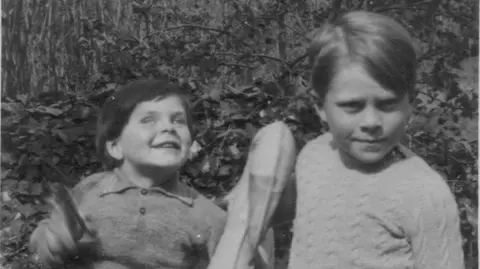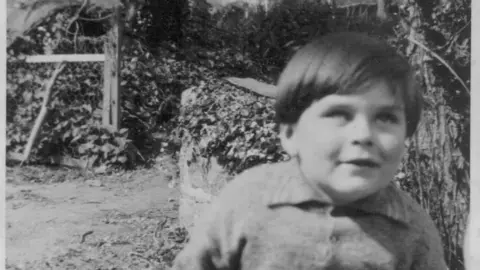'I wasn't evacuated because I was blind'
 Peter Campbell
Peter CampbellA Guernsey man who was not able to evacuate before the start of the German Occupation due to being blind has shared his memories of the period.
Michael Campbell was seven when World War Two started and when his family was evacuated to England, his mother was advised to leave him in the care of the Guernsey Blind Association (GBA).
He had lost his sight at the age of one and had been looked after by the GBA at Candie Villa since then.
Mr Campbell said he and the one other blind child at Candie Villa, Neville Tostevin, were "like brothers" until Mr Tostevin's passing in 2016.
He said he remembered clearly the day his mother Doris came to Candie Villa with plans to take him to England, along with his older brother Colin and baby sister June.
His father, an Englishman, had been called up to the Army the year before.
He said Miss Richards and Miss Marrs, the "two maiden ladies and kingpins" of the GBA, thought it would be "too much" for his mother to manage a blind child as well as two other children.
His mother was told he would be safe on the island but would be sent to her with an escort "if there was any trouble".
He did not see her again until 1946, when she came to Guernsey for a short holiday.
He said: "It was a general view held that working class parents would have difficulty bringing up blind children, so I had got used to being parted from my mother and father over the years, from babyhood."
He remained under the care of the GBA until he went to boarding school in England in 1948 when he was 16.
'Started dropping bombs'
Mr Campbell's childhood was spent learning geography, arithmetic, braille and most of all, music, with Mr Tostevin, who was partially sighted and would read encyclopaedia entries and newspaper weather reports to him.
He recalled the friends playing together in Cambridge Park with a ball with a bell inside it on Friday 28 June 1940, when "the German planes which had been taking a look at the islands for a couple of days started dropping bombs".
Mr Campbell said: "I didn't understand about the machine gunning and the bombing, but I heard these funny rattling noises and I thought: 'Goodness, there's something wrong with his engine'.
"And then when the bombs were dropped, I thought: 'Oh, thank goodness it didn't fall on this house', but of course it was the Germans bombing the harbour."
Mr Campbell remembered Miss Marrs reading from the local paper that the Germans were now in control of the island.
"I have very vivid memories of aeroplanes going over, which was the German troops landing, bringing these huge troop carriers.
"Miss Marrs told us that some of the planes were so low that she could see the man at the controls.
"I don't know if that's true. She had a great feeling for a sort of drama."
Food parcels and messages
Mr Campbell said the main thing that worried the boys during the occupation was a shortage of food, and the "lowest times" were during three weeks in 1945 when they had no flour to make bread.
He recalled receiving Red Cross parcels from Canada and New Zealand at the end of 1944.
"I can remember the exciting day we went to fetch those - it was New Year's Eve 1944, a Sunday - and they even opened up Fisher's Corner Shop for us to collect them.
"There were tins of corned beef, boxes of cheese, chocolate, ham, and even some tea.
"We used to have blackberry or carrot tea, and parsnip coffee, but it was the real thing in these Red Cross parcels."
Mr Campbell said he tried a cup of tea with sugar that New Year's Eve, but that he had become so used to drinking it without sugar that "from that day to this, I've never had sugar in my tea".
 Peter Campbell
Peter CampbellHe received a Red Cross message from his mother about once a year.
In one letter, his mother wrote: "Braille books coming soon!"
Mr Campbell said he had always wondered if it was a coded message saying the war was ending soon because no braille books came.
He remembers the exact wording of the first message he received from her: "Fondest love from all. Hoping you and all are well.
"It's always stuck in my mind, that one."
After school, Mr Campbell went to the Royal College of Music and worked as a teacher before retiring.
He was also married for many years before his wife passed away in 2021, and now lives in Worcester.
Mr Campbell shared his story as part of the Island Memories Project - a partnership between the BBC and Guernsey Museums aiming to preserve people's stories.
Follow BBC Guernsey on X and Facebook. Send your story ideas to [email protected].
